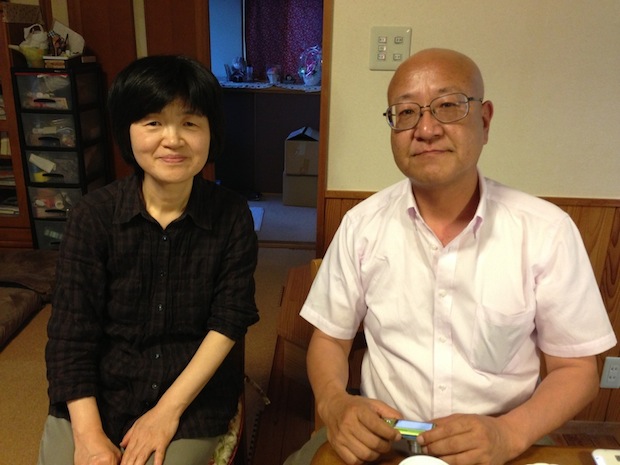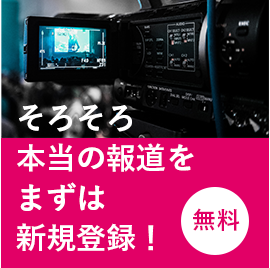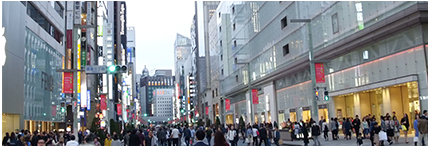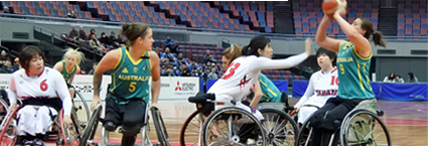A Decontamination Machine for Survival BY AYANO KUBOTA
July 5, 2013
The voice of Ms. Ayano Kubota is regularly heard on the radio. She is herself a TV reporter as well. She is from Fukushima and since 2011, every Monday she works as an anchorperson for the Koriyama local radio program “Asa Koko”. She plays a proactive role in the coverage of issues related to Fukushima and is actively involved in the project “Voice of Fukushima”.
Voice of Fukushima, N.5
Story of Mr. and Mrs. Nihei
For residents of Koriyama City in Fukushima Prefecture decontamination operations are a familiar scene.
Presently, full-scale decontamination operations of high-pressure washing and topsoil removal are being carried out at public facilities and private residences alike.
According to the plan set by Koriyama City local authority, decontamination operations of the city are to be conducted between FY 2011 and FY 2015. “The objective is to reduce the annual amount of radiation exposure measured in the citizen’s living environment in August 2011 by about 50 percent” during the decontamination intensive period scheduled to last until the end of August 2013.
http://www.city.koriyama.fukushima.jp/pcp_portal/PortalServlet;jsessionid=DE3AC75D32D0B4E8B266B9627B16A749?DISPLAY_ID=DIRECT&NEXT_DISPLAY_ID=U000004&CONTENTS_ID=25801#“
Koriyama shi Furusato Saisei Jyosen Keikaku” literally, “Koriyama City Decontamination Plan for Hometown Recovery” (in Japanese)
The following is the story of a married couple I met. After the disaster, a thorough research led Mr. Hiroyuki Nihei to develop an original decontamination machine along with his friends. He is presently at work to put it into practical use. His wife, Mrs. Nihei Eiko, has chosen to stay in Fukushima after the double catastrophe.
What do they both think about their current living conditions?
Hiroyuki: So far I didn’t know much about radioactivity, and even after the nuclear accident I was vaguely thinking: “it’ll be alright”. When I look back now, I realize that I didn’t have any sense of crisis. In fact, with no information about what was going on, I was just thinking that it would to be alright.
Eiko, on the other hand, shared the concerns she had at the time of the nuclear accident as follows.
Eiko: I was so scared! I was among those who thought that “it was pressing to immediately evacuate, to flee from Fukushima”. I previously heard that breast cancer cases increased after the Chernobyl disaster and was aware that the current nuclear accident was equally dangerous. That’s why when I saw images of the explosion at the nuclear power plant on TV, I realized that the situation was serious. My feet were trembling and I could not move. I couldn’t turn my eyes away from the TV screen nor could I sleep.
Despite Eiko’s fears, Hiroyuki was still optimistic.
Hiroyuki: So I used to argue with my wife almost every day. My conversations with female neighbors triggered my interest in the accident. I found out that my wife was not alone to be anxious and realized that something serious had happened.
Since then on, Hiroyuki started taking Eiko seriously. He decided to attend discussion meetings to gather information and organized study sessions with an expert on Radiation Protection Science.
The more he accumulated information and knowledge, the more he became aware of the terrible reality.
Hiroyuki: I found myself thinking about what I could do. That’s when one of my friends suggested “Why don’t you join in decontamination operations?”, and I immediately accepted. At the time decontamination was still conducted on a trial-and-error basis. It was believed that high-pressure washing of roofs and gutters was very effective.
However, an incident challenging Mr. Hiroyuki’s views occurred.
Hiroyuki: On December 24, 2011, we were doing decontamination work at a house in Oyama district in Fukushima City. We did high-pressure washing twice in a morning and evening. But oddly enough, the radiation level did not decrease at all. On the contrary, the radiation dose was higher than in the morning. The snow started falling. I asked myself “what am I doing here on Christmas Eve?” and felt very sad and desponded.
So far Hiroyuki had successfully decontaminated 4 houses. The question was “why only one case was a failure?” This experience constituted the starting point of Hiroyuki’s investigations about decontamination.
Hiroyuki: In January 2012, upon entering the New Year, I seriously started doing research on decontamination with my friends. Our efforts sought to mitigate radioactivity based on the fact that cesium mostly accumulates on the ground. This led us to make a decontamination machine which washes topsoil.
How did Eiko perceive the change in her husband who had been indifferent to radiation even after the disaster and who was now developing a decontamination machine?
Eiko: I wondered what happened to my husband, who was unresponsive to whatever I told him after the accident. I thought it was possible to craft a simple decontamination device, but I have never imagined that he could develop such an elaborate machine.
Just after the accident, Eiko was frustrated with her husband’s indifference to radioactivity, but she grew annoyed with him who now talked about decontamination every time she returned home, which sometimes ended up with quarrel.
Hiroyuki sometimes received criticism when he talked about his plans to develop a decontamination machine.
Hiroyuki: I used to buy fabric materials to make the filtering part at a craft shop located in another city of Fukushima Prefecture. The shop owner was cooperative at first, but after a month or so, all of a sudden he told me: “Stop doing such a thing. It won’t change anything”. He continued: “For example, people with less money eat locally grown rice and vegetables, while those who can afford it eat rice and vegetables from other prefectures. Isn’t it alright like that?” I got mad and stopped buying there.
Fukushima Prefecture residents are far from being unanimous about the way to tackle the radiation issue. They are particularly divided over the following questions concerning the decontamination issue; Is it necessary to decontaminate or not? Are decontamination operations to be conducted on residents own initiative or government-led? Should go back and live in already decontaminated zones? What to do with the contaminated soil amassed during decontaminated operations? There is also a view that first of all, decontamination operation is a waste of money since the situation at the Fukushima No.1 and No.2 Nuclear Power Stations is not yet fully under control.
Each resident of Fukushima Prefecture perceives the decontamination issue and other related problems from a different standpoint. The decontamination issue and its consequences are differently viewed depending on generations, sexes, communities, and family environments.
The clash of opinions doesn’t just mean a difference in ways of thinking. It sometimes escalates into quarrel susceptible to ruin the relationship within a community. And families come to be equally affected.
The Nihei try to prevent such troubles through a mutual sharing of opinions.
Hiroyuki: Without the nuclear accident, a lot of married couples might have been living happily, but it can’t be helped. Quarrel over decontamination is not the sole cause of family breakups. Some families were set apart for evacuation reasons and ended up with divorce.
Eiko talked about her current situation while her husband was busy with the development of the decontamination machine.
Eiko: I think it’s just my fate that I am living in Koriyama City right now. Leading my life here, I have no choice but do what I can do. Now that it has become a serious global problem, we have to think about nuclear power regardless to where we live.
With a new partner, the development of the decontamination machine seems to be advancing. Hiroyuki hopes to complete it by September and utilize it on a private basis.
Hiroyuki: For now it’s useless to try to persuade people who don’t care about decontamination. We are going to appeal to people who want to do something about hazardous substances. The decontamination machine is but one among weapons that can allow us to keep living here.
“The decontamination unit is but one among weapons that can allow us to keep living here--”. How long is it going to take to all Fukushima residents to understand this fact? What weapons are going to be needed in the future for Fukushima residents to battle against the invisible enemy: radiation?
Mr. Hiroyuki Nihei’s blog “Ojisantachi no Jyosen Funtou-ki” literally “A Record of Old Guys’ Struggle for Decontamination” (in Japanese)
(http://ameblo.jp/ojf/)
[caption id="attachment_10763" align="alignnone" width="620"] Mr. & Mrs. Nihei[/caption]
Mr. & Mrs. Nihei[/caption]
(Translated from Japanese by Naoko Miyajima)







